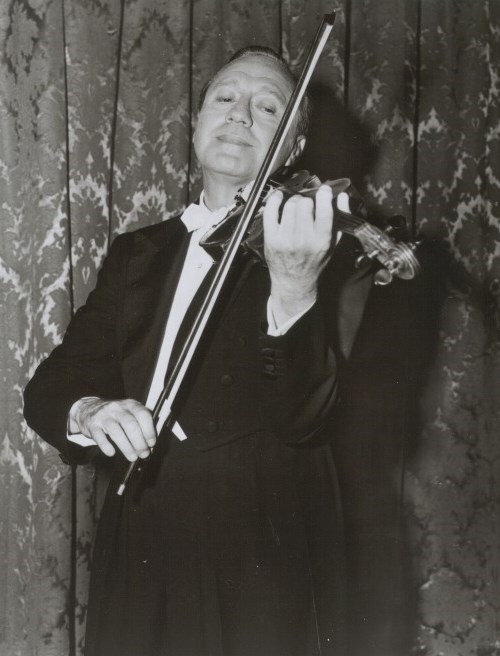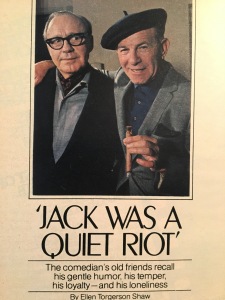
JACK BENNY: (to orchestra leader upon entering) How’s the show been going so far?
ORCHESTRA LEADER: Just fine.
JACK BENNY: Well, I’ll put a stop to that.
Except for Will Rogers (who doesn’t count because he was a saint) Jack Benny was the most beloved figure in show business history, by both the public and his colleagues. So loved was Benny that Bob Hope, who apparently loved no one, delivered the eulogy at his funeral. In it, Hope called Benny “the undisputed master of comedy timing”, a sentiment that is universally shared to this day. It was that skill as a comedian that allowed Benny to become one of the handful of performers to conquer stage, screen, radio and television.
He was born Benjamin Kubelsky in Waukeegan, IL in 1894. Contrary to his self-created popular image, he was actually an an excellent violinist. He began playing at age six, was considered a child prodigy, and was sent to take lessons from a prestigious teacher in Chicago. But Kubelsky was not cut out for long hours of study. He dropped out of music lessons – and school – in the 9th grade. At age 16 he began working as a violinist at the Barrison Theatre, a vaudeville house. He worked there for two years, until the theatre folded. At the point, he formed an act with Cora Salisbury, the Barrison’s 45-year old pianist: “Salisbury and Kubelsky, from Grand Opera to Ragtime”. A lawyer for a violinist named Kubelik sent him a letter ordering him to change his name (it was too similar to his client’s), so he became Ben Benny.

In 1914, Cora dropped out, to be replaced by a young man named Lyman Woods. Benny and Woods became a top second rate act, earning $3-400 a week, very good money for those days. The hook was that the two of them mugged and made faces while they played. In 1917, the team got a shot at the Palace, but they bombed, mostly because they followed an animal act and the audience hadn’t arrived yet. There was no time to mope about it, though. Soon thereafter, Jack Benny was drafted into World War I. Oddly enough, it was Benny’s service at the Great Lakes Naval Training Station that provided him with his real big break. When asked to perform at a camp show, he first essayed some classical music on his violin – which of course went over like a lead balloon with the mostly working-class 18-25 year old men who comprised his audience. A fellow performer William O’Brien (later to become a famous movie star under the name “Pat”) urged him to go out again and pad for time. Instinctively, Benny told some jokes he knew, and he scored a big hit. He was recruited next for a touring Navy show The Great Lakes Revue which is very successful. Now he had a couple of years as a comedian under his belt.
In 1919, he returned to vaudeville as Ben K. Benny, doing “Fiddle Funology” a single act wherein he told jokes, sang and played the fiddle.
Then it happened once again, like something out of one of his own routines: a lawyer for bandleader Ben Bernie wrote insisting that he cease using his current stage name, it being too similar to his client’s. At this point, Benjamin Kubelsky finally became Jack Benny. During these years, Benny began playing the violin less and less, until it became almost completely vestigial. Benny clutched it as a prop for confidence during his monologues, seldom playing it except for the occasional comical-dissonant scratchings. At one point, he partnered up with Dorothy MacGuire, better known as “Penny Singleton” the actress who played Blondie in the film series based on the comic strip).

You can get a really cool (and rare) glimpse of Jack Benny the pre-radio vaudeville star, stand-up comedian and m.c. in the movies The Hollywood Revue of 1929 and The Medicine Man (1930).
Benny’s long career in broadcasting started in 1932 with the Canada Dry Ginger Ale Program and continued with a half dozen other sponsors (notably Jell-O) through 1955, by which time he’d already begun his tv series, which ran 1950-65. Over the course of those 33 years, America followed the adventures of “Jack Benny” a wholly fictitious character who was famously stingy, self-centered and vain (claimed to be 39 years old for the last 40 years of his life). Around him grew a cast of characters almost as beloved as he was: announcer Don Wilson, bandleader Phil Harris, Irish tenor Dennis Day, his “manservant” Eddie “Rochester” Anderson, Mel Blanc (in various character roles) and Benny’s wife Mary Livingstone.

Benny continued to do a couple of tv specials a year in the remaining decade of his life; indeed, he was planning one at the time he died in 1974.

These specials were how I first knew Jack Benny — he was a much-beloved contemporary fact of life when I was a kid, and I adored him. It was only later that I was able to go back and discover the famous Benny of earlier decades. He was also very present on other peoples’ talk and variety shows, to wit:

Benny also had a movie career from 1930 through 45. Though he never set the world on fire as a movie star, he did some very solid pictures, including George Washington Slept Here (1942) and Ernst Lubitsch’s 1942 To Be or Not To Be, which was remade by Mel Brooks in 1983. A bad experience with his last film The Horn Blows at Midnight (1945) persuaded him to retire from the movies. His last film was to have been Neil Simon’s The Sunshine Boys (1975), in a part written for him, but he died before shooting began, and so was replaced by George Burns. I think Burns would agreed with me that Benny would have been much, much funnier in the role.



To learn about the roots of vaudeville, including stars like the great Jack Benny, consult No Applause, Just Throw Money: The Book That Made Vaudeville Famous, available at Amazon, Barnes and Noble, and wherever nutty books are sold.

[…] her old salary. By 1927 she was doing well again, and had even developed a sketch with the young Jack Benny and the team of Burns and […]
LikeLike
[…] identified with the character “Rochester”, Jack Benny’s raspy-voiced, wisecracking comic butler on radio and tv from 1937 to 1965, Eddie Anderson had a […]
LikeLike
[…] of Music, and the Star. Of these, the Majestic was said to have been the most beloved. Comedian Jack Benny, a Waukeegan native, felt it was “the most beautiful, perhaps the most dignified theatre in the […]
LikeLike
[…] he became known for. This led to voice work on the top comedy shows of the radio era, Fred Allen, Jack Benny, Milton Berle, Burns and Allen, Eddie Cantor, and many others. He became part of Olsen and […]
LikeLike
[…] them) were the ultimate sister act – they were Siamese Twins, joined at the base of the spine. Jack Benny told an anecdote about one night answering a knock on his dressing room door and receiving Daisy […]
LikeLike
[…] which were cut from the final print. In the 50s he was frequently seen as a semi-regular on The Jack Benny Show, usually as an irascible help-desk employee (“I dunno!” was his catch-phrase). But he fell […]
LikeLike
[…] so he was offered the job of stooge, which he took. Born Lawrence Fineberg in 1906, Fine, like Jack Benny, started out as a serious violinist, but had gradually introduced eccentric comedy into the act. […]
LikeLike
[…] with reverence about Frank Fay. He originated the stand-up comedy style we associate with Hope, Benny, Carson, Leno and Letterman, the extremely polished “American Institution” style, an unspoken […]
LikeLike
[…] is responsible for Jack Benny’s stage name. In 1921, the comedian (whose real name was Benjamin Kubelsky) began calling himself Ben […]
LikeLike
[…] or not, Jack Benny called him “the world’s greatest comedian”. George Burns said he was “the greatest of us […]
LikeLike
[…] no bigger star than Eddie Cantor in his heyday. He conquered more media than even Hope, Rogers or Benny: vaudeville, Broadway revues and book musicals, films, radio, tv and – because he was much a […]
LikeLike
[…] limitations as a performer, but in radio, his verbal acuity found its perfect medium. Along with Jack Benny (with whom he created broadcasting’s first running “feud”) Allen became radio’s top […]
LikeLike
[…] began with a role in the 1975 Neil Simon film The Sunshine Boys, a part originally intended for Jack Benny, who had just passed away. Burns had been slated to deliver the eulogy at Benny’s funeral, but […]
LikeLike
[…] Henny a hack? After all, didn’t Jack Benny already play a violin badly for laughs? Didn’t Milton Berle already fire off an […]
LikeLike
[…] style of walking on and off stage, which he consciously borrowed from monologist Frank Fay (as did Benny). Hope was still doing regular tv specials right up until the early 1990s, when his frail body […]
LikeLike
[…] and traveling in the same pack (which also included George Burns, George Jessell, Eddie Cantor, Jack Benny, et al.) this singer/comedian’s most famous bit consisted of rhyming his jokes and setting them […]
LikeLike